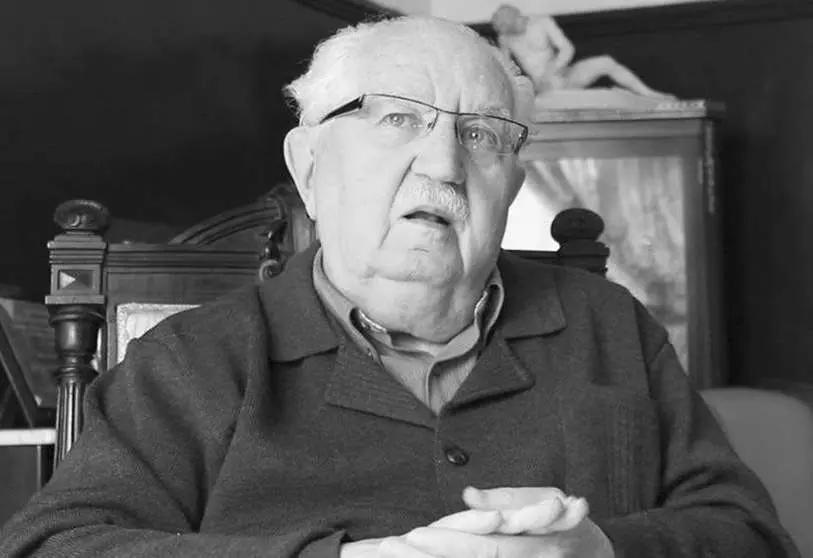Tribute to Montávez, in the middle distance

This February 14, 2023, Pedro Martínez Montávez has changed dimension, from the earthly to an unknown one, and my head and my key ask me to write a column in his honour, which is a tribute to the Arabist who taught me and directed the Department of Arab and Islamic Studies at the Autonomous University of Madrid in the eighties, probably also a tribute to my youth as a student of Arabic Philology, just as Joan Baptista Humet wrote a song about his adolescence.
It is a mid-distance homage, because from this moment on I designate myself as the spokesperson for so many students and graduates who end up working professionally in something other than what they studied; the world is full of geographers, historians, biologists, graduates in the subject and then their professional careers lead them to other tasks, in my case to journalism and communication.
I didn't want to pull out the notes from my degree that are sleeping somewhere in the lumber room or from Saint Google, but to write a few words from my memory or impressions somewhere stuck, words that I would probably never have dared to say to him in person, there wasn't enough trust and I didn't follow him around the university or in specialised forums.
I identify Professor Montávez as a reference in Spanish Arabism who turned the traditional focus of Arab studies in Spain from the Middle Ages, many of them looking for the Christian traces of Al-Andalus, to the contemporary period. He had the interest and the wisdom to look for the traces of Al-Andalus, but in the Arabic literary work of the twentieth century.
I associate Professor Montávez with the Syrian poet Nizar Qabbani, whom he translated; with his "History of Modern Arabic Literature", the handbook of many, and with such sonorous names as Abdul Wahhab al-Bayati, Badr Shákir al-Sayyab, Fadwa and Ibrahim Tuqán, Tawfiq al-Hakim, Gassán Kanafani, personalities of Arab literature and culture of whom I could say little and whose music still echoes in my head, and Taha Husein, he spoke a lot about Taha Husein.
I remember attending many evenings of lectures at the Asociación de Amistad Hispano-Árabe, Calle Príncipe de Vergara in Madrid, like someone attending a session of a Masonic lodge entering through a hollow tree. In that forum and in others he frequented or promoted, there was a desire to disseminate beyond specialised academic circles; also in part of his immense publishing output, I remember from that period books with modest binding and a lot of content, in Cantarabia, in those publications of the Instituto Hispano Árabe de Cultura, the predecessor of the later Instituto de Cooperación con el Mundo Árabe and today's Casa Árabe.
Montávez was an Arabist from the East, there are those from the ninth century and those from Morocco; he must have gone to Egypt after graduating and there he experienced the pan-Arabism of Gamal Abden Náser, a certain euphoria of the 1950s and 1960s; from a certain period as a translator for the Foreign Office, I remember him telling of his surprise on hearing the sound che pronounced in Iraq, and later I personally verified it as a reader of Spanish during a stay between the wars.
I remember that class at the Autonomous University in which we smoked like crazy, the spring festivities and a huge blackboard, with chalk and eraser, full of fractal plurals, a convoluted way in which the Arabic language departs from regularity and makes strange plurals, which we later discovered also followed some kind of irregular logic.
And we were also fractos, those of us who were studying Arabic Philology there, a little more than two dozen in class, it is often forgotten that students learn something and also learn to be a person, with the detours that come with age, while now we are asking primary school children to decide their vocation once and for all.
Pedro Martínez Montávez demonstrated with his career that it is possible to be born in Jaén and be a wise man, and he showed it without stridency hidden behind his moustache and a deep voice with which he expressed a rather rhetorical discourse that he liked to use Arabic words as a spur.
He opened many innovative paths and several of them led to Latin America, in search of the literature and life of the Arabs who emigrated by the thousands at the end of the 19th and beginning of the 20th century (máhyar), many of them Lebanese, then under the Turkish Empire and who appear as Turks in García Márquez's novels.
This column is a vindication of my university education and subsequent trajectory, neither directly linked to nor detached from the Arab world, somewhere in between, an intermediary in my case between Arabists by profession and the general lack of knowledge on Arab issues, a defence of intermediaries, such as journalists or politicians, today discredited by the lights of technology and the shadows of populism, and more necessary than ever.
Montávez was rector of the Autonomous University and the chronicles say that at that time he facilitated a conference in which Muammar Gaddafi himself took part with his "Green Book", which served as an inspiration to the extreme left and the extreme right of those years. The professor's biography and career does reveal an informed political commitment to Palestine, disseminating its literature and history; the invasion of Iraq and the Arab Springs mark a more recent stage.
With Pedro Martínez Montávez I identify my university days, and a circumstance that surprised me then and which I have not forgotten for decades was that I listened, I discovered with him that you have to be very wise and very intelligent to listen carefully to the unelaborated discourse of a young man off-centre in search of something diffuse.

